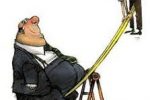One of Dobelli’s main arguments is the fact that the information presented at the moment (especially in a dramatic way) is assessed by us as much more important than it really is. The good example is the ongoing trade war. First, let’s take into consideration how often the trade war have been discussed within the last six months. Then, let’s compare this with the frequency of news on the deteriorating economic situation (recession in Italy and Germany, issues in China or Japan). From the investor’s perspective, this second issue is more important, and yet the topic No. 1 dominates in the media. Why? Because you can make a good show out of it and write about it every day.
Since we have already mentioned this, it is possible to add another Dobelli’s argument. He emphasizes that if the news really give such an advantage both in investments and in other areas, journalists would be the richest people in the world. Everyone can judge what’s the reality. The fact is that journalists are required to provide a certain number of texts at work. Therefore, this is why they mostly provide embarrassingly shallow information.
Here is another problem. We are overwhelmed by the huge number of shallow news, which (in the case of investors) contain gigantic amounts of data but little or no knowledge. In this way, we litter our mind and waste time, while limiting our ability to actually explore the subject and think creatively.
Dobelli also raises one important issue. News are usually very short. They roughly require about 20 seconds of our attention and… that’s all, we put some more data in our heads again. Unfortunately, usually we do not notice that thousands of such news limits our ability to maintain concentration over a longer period of time. In the best case, we see it after a time when reading a book is becoming more and more difficult. Older readers will probably think “non sense!”, but the majority of young people know perfectly what is going on, because this problem already affects them.
Dobelli’s last argument is the fact that people are simply healthier when they do not follow the news.
Our observations
After listening to Rolf Dobelli we quickly created a list of insights on this topic. Let’s start with the issues related strictly to investments.
The type of information that strongly affects investors are the recommendations of brokerage houses. We could recommend checking the effectiveness of analysts’ forecasts or the performance of investment funds, but it would be better to give first-hand example. The stock company of our friend was valued twice by the same firm. Despite the fact that there were no major changes within the company between the first and the second valuation (only the share price dropped significantly), the first target price was PLN 4, and the second PLN 1.80. When the owner asked, “where does the difference come from?” The analyst replied that “previously the company’s price was increasing and now it is falling”.
We absolutely do not say that the valuation process can end up the same in each case. We only show how dangerous it is to use recommendations from brokerage houses, whose employees often make an analysis under pressure.
Let’s go back to the daily news. In regards to that, Nassim Taleb in his book called “Black Swan” touched on an important issue. He pointed out that for economic journalists it is really common to assign the reason for every event. Everything needs to have an explanation and no one even thinks that certain events can be accidental. That’s why in the headlines we read “Stocks are rising as a result of good data from the labor market” or “Indices fall through lack of agreement between USA and China” and so on. Journalists always have some explanation, although many other factors influence the stock exchange at the same time. The problem is that many market participants treat these suspicions of journalists as revealed truth and in this way build their image of the market. Unfortunately, they will not see the information in the media headlines “The shares are rising, because President Trump asked the Plunge Protection Team for the intervention.”
Another example are the news of the companies results. We all know that they are important. However, the problem is that the headlines are shouting to us that “Company X showed better than expected results”. Perhaps, we repeat ourselves in this matter, but notice that a man who checks the news selectively and does not have time for deeper analysis will not come to mind how these results are still “better than expected” all the time. We described it in details in our article “How to conjure results better than expected” https://independenttrader.org/how-to-conjure-results-better-than-expected.html.
Additional argument that the common news are harmful is the fact that they take away the time that we could devote to the analysis of historical data. The difference is crucial. News often evoke emotions, while long-term analysis help us look at the market more reasonably. Effect is that the news-based investor will buy shares in the US. Why? Because the price increases. On the other hand, someone whose decisions are based on analyzes will look for the market with a price to earnings ratio below 8. In the long term, this second person will earn much more. This is confirmed by the results of the MOAR portfolio strategy by Michael O’Higgins compared to the main stock indices in the US.
Our last observations goes beyond the world of investment and concerns the role of media and politics in our lives. During the dominance of radio and television the idea was quite simple. There was a specific message for the citizens, there was no discussion or space for an independent insights. A lot has changed when the Internet has become more popular. From then, billions of people have gained access to the real knowledge, where they can read the texts of both biased and objective authors. As a result, an increasing part of society (mainly talking about young people) comes to the conclusion that the role of politicians in their lives could be much smaller and completely nothing wrong would happen. The only response from politicians and related media is to play on emotions, and preferably – to maintain an atmosphere of fear and hate. Therefore, news are largely like a circus full of wild animals in which dominate: the war between Republicans and Democrats (both parties sponsored by the same people), alleged and true crimes of dictators in the Middle East, Iran’s armaments, potential war with North Korea, and now also a trade war with China. Hence, the more time you devote to the news, the more your head is occupied by the topics you follow. As a result, it seems that you need politicians from the party X to defend you against politicians from the party Y, or vice versa.
Conclusions
First of all, we would like to point out that we do not entirely support the Dobelli’s approach, who has cut off himself from the news completely. We can not ignore the reality that surrounds us. The facts are that as a result of the use of this power of fear , the bankers have completely made the financial markets dependent on their actions. Therefore, even long-term investors should pay attention to the announcements of central banks.
However, this does not change the fact that the vast majority of news we are bombarded with is an obstacle on the way to a good investment result. Therefore, the optimal solution is to spend up to 10% of the time you have on listening or reading. Try to focus on books, newsletters, blogs, historical data analyzes, movies and valuable YouTube channels. After a few months you will gain a new real knowledge. Your creativity will improve, and emotions will play a smaller role. You will be able to distinguish between reliable information and propaganda. This is the key to success.
Ultimately, the stock market is still a good place for rational people. The financial market is the place where rational individuals can take away money from those people who are susceptible to emotions. Although we admit that in the case of the current stock exchange cycle, it takes an extremely long time.
During the writing of conclusions, we have reminded ourselves that sometimes the best investors admit in interviews that they have made the best investment decisions in their lives after a period of total cut-off from the finance world. This was the case of Stanley Druckenmiller, whose break lasted months. It is a liitle different case than cutting of the news itself, but it also gives a food for thought.
At the end, we leave you with one question from Rolf Dobelli:
“Are you able to find at least one of the thousands of news stories you heard last week that allowed you to improve your private or professional life?”
For more market trends, visit ETF Trends.








